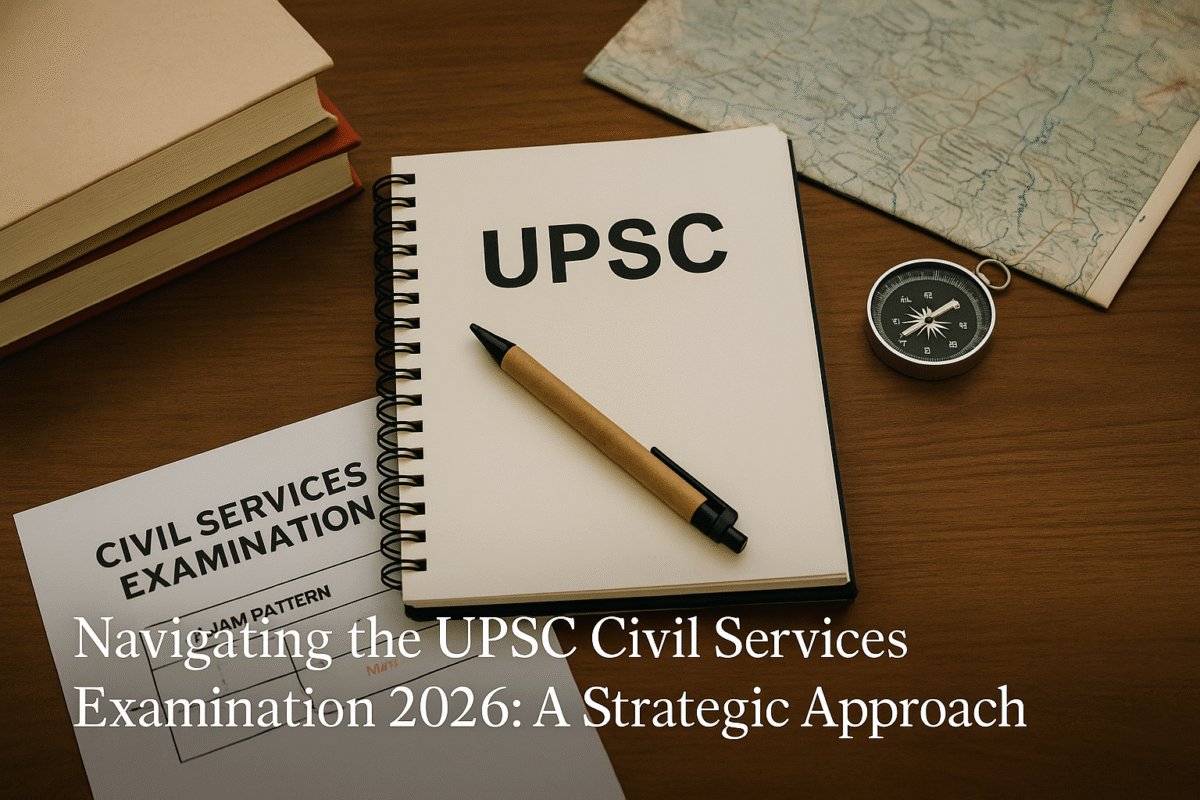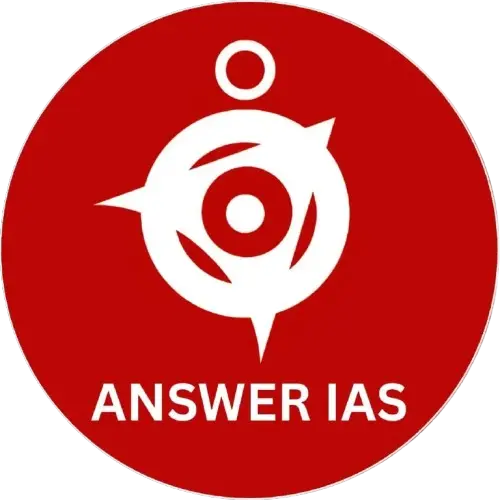
The journey to becoming an IAS, IPS, or IFS officer requires meticulous planning, unwavering dedication, and a smart UPSC 2026 strategy. This comprehensive guide will help you navigate the challenging path ahead with confidence and clarity.
Understanding the UPSC 2026 Examination Structure: Breaking Down the Challenge
The first step in your UPSC 2026 strategy is understanding what you’re up against. The UPSC CSE consists of three distinct stages:
- Preliminary Examination: This initial screening includes two papers:
- General Studies Paper I (counted for ranking)
- CSAT Paper II (qualifying nature with 33% minimum)
- Main Examination: The heart of the assessment with nine papers:
- Two qualifying language papers
- Essay paper
- Four General Studies papers
- Two papers on your chosen Optional Subject
- Personality Test (Interview): The final hurdle assessing your suitability for civil services
Your UPSC 2026 strategy must address each stage methodically, with specific preparation techniques tailored to the unique requirements of each level.
Foundation Phase: Building Strong Basics for UPSC 2026 Strategy
How to Master Fundamental Concepts Without Feeling Overwhelmed
The foundation phase of your UPSC 2026 strategy is crucial. Many aspirants make the mistake of diving into advanced materials before solidifying their basics.
Start with NCERT textbooks (Classes 6-12) for core subjects:
- History (Ancient, Medieval, Modern)
- Geography (Physical, Indian, World)
- Polity (Constitution, Governance)
- Economics (Basics, Macro/Micro concepts)
- Science & Environment fundamentals
Pro Tip for UPSC 2026 Strategy: Create concept maps connecting related topics across subjects. This interdisciplinary approach mirrors how UPSC frames questions.
Decoding Previous Years’ Papers: Learning from Past Patterns
A strategic analysis of previous years’ question papers should be an integral part of your UPSC 2026 strategy. This reveals:
- Recurring themes and topics
- Question patterns and difficulty levels
- Expected depth of knowledge
Dedicate at least one day per week to solving and analyzing these papers. Note patterns and prioritize topics accordingly in your UPSC 2026 strategy.
Intermediate Phase: Deepening Knowledge and Integration
How to Connect Static and Dynamic Content Effectively
As you progress in your UPSC 2026 strategy, you’ll need to bridge the gap between static syllabus content and dynamic current affairs. This integration is often where many aspirants struggle.
For each static topic you study, identify its contemporary relevance:
- Constitutional provisions → Recent Supreme Court judgments
- Economic theories → Current government policies
- Historical events → Modern parallels and commemorations
Selecting the Perfect Optional Subject: A Critical Decision in Your UPSC 2026 Strategy
Your optional subject can make or break your final ranking. When choosing, consider:
- Personal interest and aptitude
- Overlap with General Studies
- Availability of quality study materials
- Scoring trends in recent years
The right choice aligned with your strengths can give your UPSC 2026 strategy a significant advantage.
Advanced Preparation: Mastering Test-Taking Techniques
Solving the Time Management Puzzle in Prelims
With 100 questions in 2 hours for Prelims Paper I, time management is critical. Your UPSC 2026 strategy should include:
- Sectional time allocation based on your strengths
- Quick elimination techniques for MCQs
- Strategic guessing when appropriate (considering negative marking)
- Regular timed mock tests to build stamina
Practice with at least 50-60 full-length mock tests before the actual Prelims as part of your UPSC 2026 strategy.
Developing Answer Writing Excellence for Mains Success
The Mains examination tests not just knowledge but your ability to present it effectively. Your UPSC 2026 strategy must include daily answer writing practice focusing on:
- Understanding directive words (analyze, examine, discuss)
- Structured presentation (introduction, body, conclusion)
- Incorporating relevant facts, case studies, and examples
- Diagrams and flowcharts where appropriate
Start answer writing practice early in your preparation cycle, not just in the post-Prelims phase.
Current Affairs Approach: Smart Strategies for Information Management
Creating an Effective Current Affairs System Without Information Overload
Current affairs can seem endless and overwhelming. A sustainable UPSC 2026 strategy for current affairs includes:
- Daily newspaper reading (The Hindu or Indian Express)
- Monthly compilation and organization by GS paper topics
- Focus on government initiatives, international relations, and economic developments
- Regular revision using mind maps or flash cards
Remember that for UPSC 2026 strategy, quality of analysis matters more than quantity of information.
Revision Techniques: Ensuring Long-term Retention
Multi-layered Revision Plan: The Secret to UPSC 2026 Success
Revision is where most UPSC journeys succeed or fail. Implement a three-tier revision system in your UPSC 2026 strategy:
- Daily micro-revisions: 15-30 minutes reviewing the day’s learning
- Weekly consolidation: Summarizing the week’s topics into condensed notes
- Monthly comprehensive revision: Full-length tests and topic-wise reviews
This layered approach ensures information moves from short-term to long-term memory, a critical component of your UPSC 2026 strategy.
Mental Well-being: Sustaining Your UPSC 2026 Journey
Preventing Burnout: Maintaining Motivation Through the UPSC Marathon
The UPSC preparation journey is not just academic but also psychological. Your UPSC 2026 strategy must address mental well-being:
- Schedule regular breaks and leisure activities
- Form or join study groups for motivation and knowledge sharing
- Practice stress-management techniques (meditation, exercise)
- Set realistic milestone goals to celebrate progress
Remember that consistency trumps intensity in your UPSC 2026 strategy.
Final Interview Preparation: Making a Lasting Impression
Personality Development: Beyond Knowledge to Officer-like Qualities
Your UPSC 2026 strategy culminates in the personality test. Preparation should include:
- Thorough knowledge of your Detailed Application Form (DAF)
- Current awareness on national and international issues
- Mock interviews with experienced panelists
- Development of balanced opinions on controversial topics
The interview tests not just what you know, but who you are and how you think.
Conclusion: Executing Your UPSC 2026 Strategy With Confidence
Success in the UPSC examination comes to those who not only work hard but also work smart. Your UPSC 2026 strategy should be personalized, flexible, and comprehensive. Start early, stay consistent, and adapt as needed.
Remember that every successful civil servant once stood where you stand now. With the right UPSC 2026 strategy, dedicated effort, and resilience, you can join their ranks. The journey may be challenging, but the destination—serving the nation—makes it worthwhile.
Begin implementing your UPSC 2026 strategy today, and take the first step toward realizing your dream of becoming a civil servant.
Also Read
- UPSC Syllabus
- UPSC Booklist : Comprehensive Guide for Prelims, Mains, and Interview
- UPSC CSE Prelims 2026: Exam Date, Syllabus, Eligibility, Admit Card, and Preparation Guide
- IAS power vs IPS power: Comprehensive Comparison of Roles, Power, and Career Paths in 2026
- Complete Guide for UPSC 2026 preparation strategy Without Coaching
- When Should You Start Preparing for the UPSC Civil Services Exam?
- UPSC Exam Pattern and Marking Scheme: A Comprehensive Guide for Prelims and Mains

Leave a Reply